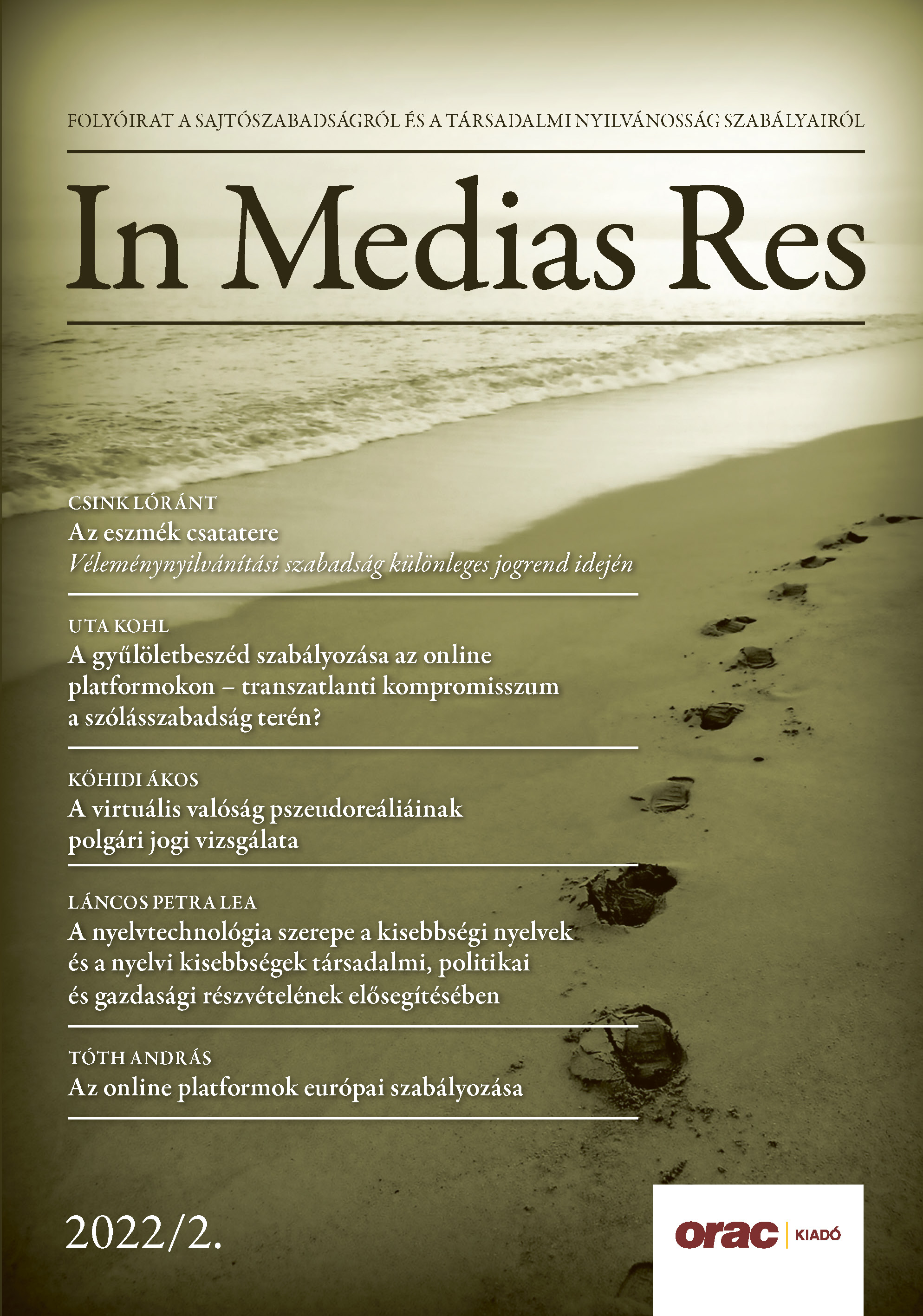Conceptual and theoretical framework for deep mediatisation
DOI:
https://doi.org/10.59851/imr.11.2.1Keywords:
datafication, digitalisation, mediatisation, social constructionAbstract
Among the processes related to network communication, the study presents the concept of deep mediatisation resulting from digitisation. In the theories related to traditional mass communication (printed press, radio, television), the nature of the process of mediation has been problematic since the 1980s, and some researchers have focused on researching the process of mediatisation instead of the media phenomenon. In this study, I explore the research traditions of mediatisation in terms of both media sociology and cultural theories. While the concept of mediatisation is used to describe traditional mass communication technologies and processes that operate in a classical, analog way, deep mediatisation is the key word for network communication on a digital infrastructure. After highlighting the differences between traditional mediatisation and deep mediatisation, I present the theory of Couldry and Hepp, which underpins a new kind of social construction theory based on deep mediatisation in the social world.
References
Andok Mónika: A kommunikáció rituális elmélete. Budapest, Gondolat, 2017.
Andok Mónika: Média mint gyakorlat. In Aczél (szerk.): Műveljük a médiát! Budapest, Wolters Kluwer, 2015, 33-38.
Andok Mónika: Médiahatások. In Aczél Petra (szerk.): Műveljük a médiát! Budapest, Wolters Kluwer, 2015, 97-132.
Andreas Hepp - Piet Simon - Monika Sowinska: Living together in the mediatized city: The figurations of young people's urban communities. In Andreas Hepp - Andreas Breiter - Uwe Hasebrink (szerk.): Communicative Figurations. Transforming Communications in Times of Deep Mediatization. Berlin, Springer, 2018, 51-80., https://doi.org/10.1007/978-3-319-65584-0_3
Andreas Hepp: Agency, social relations, and order: Media sociology's shift into the digital. 3 Communications (2022)., https://doi.org/10.1515/commun-2020-0079
Andreas Hepp: Deep Mediatization. London, Francis and Taylor, 2020, 56-99., https://doi.org/10.4324/9781351064903-3
Andreas Hepp: Digital media, data infrastructures, and space. The refiguration of society in times of deep mediatization. In Gabriela B. Christmann - Hubert Knoblauch - Martina Löw (szerk.): Communicative Constructions and the Refiguration of Spaces Theoretical Approaches and Empirical Studies. London, Routledge, 2022., https://doi.org/10.4324/9780367817183-6
Andreas Hepp: Media and communication. In Betina Hollstein et al. (szerk.): Soziologie - Sociology in the German-Speaking World. Soziologische Revue, Special Issue. Oldenburg, De Gruyter, 2020, 207., https://doi.org/10.1515/9783110627275-015
Andreas Hepp: The communicative figurations of mediatized worlds: Mediatization research in times of the 'mediation of everything'. 28(6) European Journal of Communication (2013) 623., https://doi.org/10.1177/0267323113501148
Charles Taylor: A Secular Age. Cambridge, Belknap, 2007., https://doi.org/10.4159/9780674044289
Császi Lajos: Médiakutatás a kulturális fordulat után. Médiakutató, 2008. ősz.
Daniel Dayan - Elihu Katz: Media Events: The Live Broadcasting of History. Cambridge, Harvard University Press, 1992., https://doi.org/10.4159/9780674030305
Hadas Miklós: Erőszakkontroll és intimitás. Kritikai adalékok Norbert Elias civilizációelméletéhez. Erdélyi Társadalom, 2014/2., 108.
Hidas Zoltán: Törékeny értelemvilágaink. A világalakítás rendje és szabadsága. Budapest, Gondolat, 2018, 12.
Ien Ang: A Dallas és a tömegkultúra ideológiája. Replika, 17-18. (1995) 201-214.
James W. Carey: Communication as Culture. Essays on Media and Society. London, Routledge, 2009, 24., https://doi.org/10.4324/9780203928912
Jay D. Bolter - Richard Grusin: A remedializáció hálózatai. Apertúra, 2011. tavasz.
Jose van Dijck - Thomas Poell - Martijn de Waal: The Platform Society. Public Values in a Connective World. Oxford, Oxford University Press, 2018, 198., https://doi.org/10.1093/oso/9780190889760.001.0001
Nick Couldry - Andreas Hepp - Friedrich Krotz (szerk.): Media Events in a Global Age. London, Routledge, 2010, https://doi.org/10.4324/9780203872604
Nick Couldry - Andreas Hepp: The Mediated Construction of Reality. Cambridge, Polity Press, 2017.
Nick Couldry - Ulises Mejias: The Costs of Connection. How Data Is Colonizing Human Life and Appropriating It for Capitalism. Stanford, Stanford University Press, 2019, https://doi.org/10.1515/9781503609754
Nick Couldry: Media Rituals: A Critical Approach. London, Routledge, 2003
Nick Couldry: Media, Society, World. Cambridge, Polity, 2012
Nick Couldry: Theorising media as practice. 14 Social Semiotics (2004) 115-132., https://doi.org/10.1080/1035033042000238295
Patricia Wallace: The Psychology of the Internet. Cambridge, Cambridge University Press, 2016, 32.
Peter L. Berger - Thomas Luckmann: A valóság társadalmi felépítése. Tudásszociológiai értekezés. Budapest, Jószöveg Műhely, 1998.
Pólya Tamás: A médium mint cselekvési közeg. Médiumelméleti nézőpontváltás a technológiai determinizmus után. Replika 76. (2011) 51-74.
Roger Silverstone: Médiaerkölcs. A médiapolisz felemelkedése. Budapest, Napvilág, 2010.
Roger Silverstone: Miért van szükség a média tanulmányozására? Budapest, Akadémiai, 2008
Stuart Hall: Kódolás - dekódolás. In Angelusz Róbert - Tardos Róbert - Terestyéni Tamás (szerk.): Média, nyilvánosság, közvélemény. Szöveggyűjtemény. Budapest, Gondolat, 2007, 131-143.
Viktor Mayer-Schönberg - Kenneth Cukier: Big Data. A Revolution That will Transform How We Live, Work and Think. London, John Murray, 2013, 79.
Downloads
Published
How to Cite
Issue
Section
License
Copyright (c) 2022 Mónika Andok

This work is licensed under a Creative Commons Attribution 4.0 International License.


